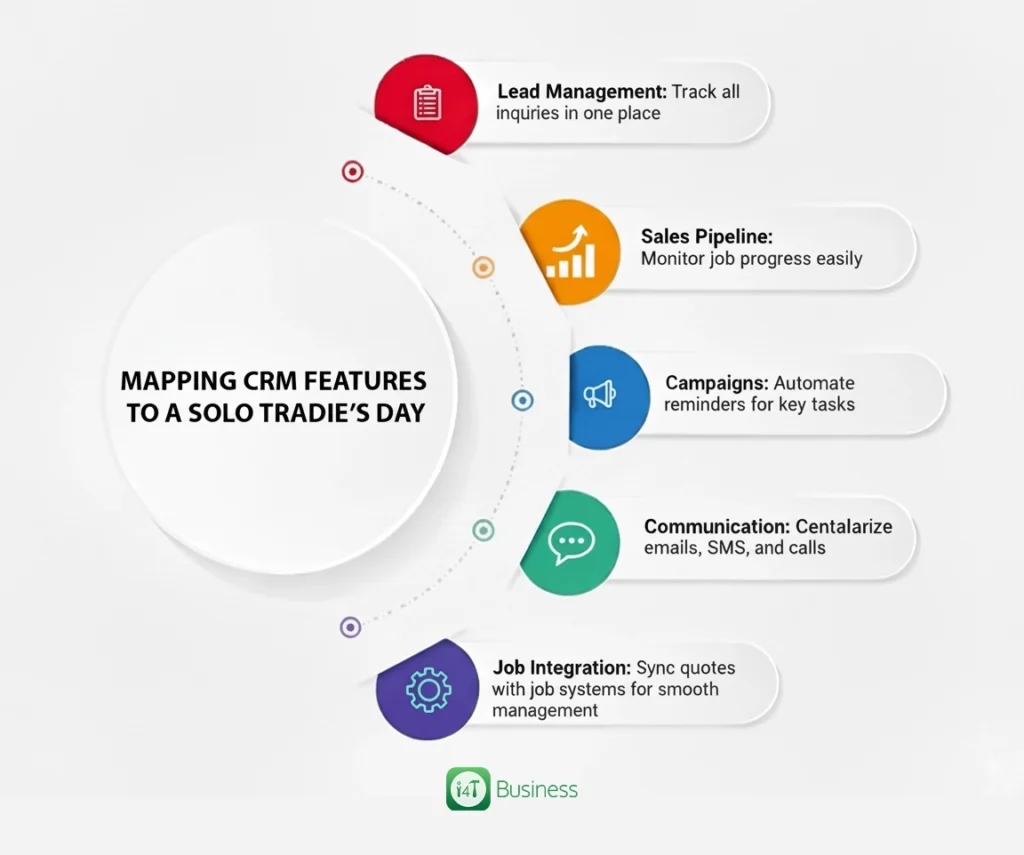Running a solo tradie business in property maintenance can feel like spinning plates. One day you’re fixing a leaky tap for a homeowner, the next you’re chasing down a property manager for job approval, all while trying not to miss calls, texts, and the odd Facebook message. Add quoting, invoicing, and keeping track of who’s paid and who hasn’t, and it’s no wonder many tradies end up working late nights on the admin instead of putting their feet up.
The challenge isn’t the work itself; you know your trade inside out. The tricky bit is juggling all the moving parts that come with running a one-person show. Leads can slip through the cracks, quotes sit waiting on approval, and it’s easy to lose track of conversations when you’re relying on a mix of phone notes, email, and memory.
That’s where a CRM (Customer Relationship Management) system can step in.
In this article, we’ll walk through how a CRM fits into a solo tradie’s world, which features matter most, and how to set things up without overcomplicating it. By the end, you’ll see how it can make your business run smoother, and give you back a few evenings too.
How CRM Software Differs From Job Management Software
CRM might sound like a bit of business jargon, but it’s really just a fancy way of saying “a system that helps you keep track of your customers and jobs.” For a solo tradie, that means no more relying on a pile of scribbled notes, text messages spread across your phone, or half-remembered conversations when you’re on the tools.
At its core, a CRM (Customer Relationship Management) system does three things:
- Keeps all your leads and contacts in one place. Homeowners, landlords, property managers, you’ll never forget who’s who or how they first got in touch.
- Tracks every job from start to finish. You can see where each lead is in the pipeline, new enquiry, quoted, waiting approval, booked, completed, without digging through old emails.
- Stores all your conversations and documents together. Calls, emails, SMS, photos, and even approvals can sit on one timeline, so you know exactly what was said and when.
Now here’s the key bit: a CRM is different from job management software. The CRM is where you win the work. It helps you grab that enquiry and follow up until you get the green light. Once the job is locked in, your job management system takes over to handle quoting, scheduling, job sheets, compliance, and payments.
When they work together, it’s a smooth handover: CRM brings in the client, job management makes sure the work gets done (and paid for) without double-handling or data entry.
Mapping CRM Features to a Solo Tradie’s Day

If you’re running your own show, every day looks a bit different. One morning, you might be chasing a leaking roof for a homeowner, and by the afternoon, you’re fixing an emergency hot water system for a property manager. In between, you’re fielding calls, replying to texts, and trying to remember who asked for a quote last week.
This is where a CRM really earns its keep, because it fits into the natural flow of your day. Here’s how the main features make life easier:
Lead management
Every call, email, or website enquiry can be captured straight into the CRM. No more scrolling through your phone wondering who “Mark Gutter Leak” was. You can see where the lead came from (Google search, referral, property manager) and keep it neat from the start.
Sales pipeline
Think of it like a whiteboard for your jobs. New lead → Quoted → Awaiting Approval → Booked → Completed. You can move each lead along as you go, and you’ll always know which ones need attention.
Campaign management
Need more work during quiet patches? Set up simple campaigns. For example, send reminders about smoke alarm checks or gutter cleaning before storm season. The CRM keeps these lists ready so you don’t have to.
Email, SMS, and call integration
Instead of digging through old texts or emails, everything shows up on one timeline. If a property manager rings to chase an update, you can quickly see your last message and reply confidently.
Integration with job management
Once the quote gets the thumbs-up, you can push it straight into your job management system (like i4T Business). From there, it’s scheduling, job notes, photos, invoices, and payments, all linked back to that original lead.
The result? Less time shuffling through paperwork and more time on the tools.
Set Up Your CRM in a Day
One of the biggest worries tradies have about new software is that it’ll take ages to set up. The good news? A CRM doesn’t need weeks of fiddling about. With a clear plan, you can have it running in an afternoon. Here’s a simple step-by-step approach that works for solo tradies:
Step 1: Define your services and area
List the types of jobs you do most (plumbing repairs, electrical faults, painting touch-ups) and the suburbs you cover. This helps you tag leads properly later on.
Step 2: Set up your sales pipeline
Keep it short and sharp. Stages like:
- New Lead
- Quoted
- Awaiting Approval
- Booked
- Completed
This way, you can glance at your pipeline and know exactly what needs chasing.
Step 3: Import your contacts
Bring in your existing clients: homeowners, landlords, and property managers. Add tags so you can sort them easily.
Step 4: Connect your communication channels
Link your email, phone, and even your website form or Google Business Profile. That way, every call or message lands in the CRM.
Step 5: Create templates
Set up standard quotes, invoices, and messages (like job confirmation texts). It saves you from typing the same thing over and over.
Step 6: Turn on automations
Things like follow-up reminders, quote chasers, or payment nudges can all run automatically in the background.
Step 7: Link your job management software
When a quote gets approved, push it into i4T Business so you can schedule the job, attach site notes, and handle payments, all without re-typing details.
By the end of these seven steps, your CRM is good to go. It won’t just sit there gathering dust; it’ll actually take work off your plate.
Capture More Leads Without Extra Staff
When you’re working solo, the last thing you want is to miss out on jobs just because you couldn’t answer the phone while up a ladder. A CRM helps you catch every enquiry and make sure nothing slips through the cracks, without having to hire extra admin help.
Missed-call text back
If someone rings while you’re busy, your CRM can automatically send a quick text: “Sorry I missed your call, I’ll get back to you soon.” It shows you’re on the ball and keeps the lead warm until you can ring back.
Web forms that feed straight into your CRM
Add a simple form to your website or Google Business Profile. When someone fills it out, their details go straight into your CRM pipeline—no copy-pasting, no forgotten scraps of paper.
Social media messages
Plenty of homeowners and property managers will flick a message through Facebook or Instagram. With the right setup, those chats can be pulled into your CRM too, so you don’t forget to follow up.
Lead tagging and sorting
You can tag jobs as emergency or routine, or note whether it’s a homeowner or property manager. This way, urgent jobs float to the top, and you know straight away how to handle them.
Instant replies and templates
Set up first-response messages that go out as soon as an enquiry lands. Even a quick “Thanks for reaching out, I’ll send you a quote shortly” makes you look professional and stops leads from wandering off to the next tradie.
With these tools in place, your CRM becomes like a silent assistant, catching calls, filing leads, and making sure you’re first to reply, all while you’re getting on with the actual work.
Keep Every Conversation in One Thread
One of the biggest headaches for solo tradies is trying to remember who said what and when. A homeowner might text you about a leaking tap, then email photos later that night. A property manager could call to approve, then send a follow-up SMS with extra details. Before you know it, you’re flicking between apps, trying to piece the story together.
A CRM clears up that mess by keeping every bit of communication in one tidy thread. Calls, emails, texts, photos, even quotes and approvals, everything sits on a single timeline linked to that client or job. No more guesswork, no more searching through your inbox while the client waits on the phone.
This isn’t just about convenience. Having a clear record protects you when disputes come up. If a landlord questions whether you quoted for a certain repair, you can show the email and SMS trail. If a property manager claims you didn’t send job notes, you’ve got proof right there in the system.
Turn One-Off Jobs into Repeat Work
A lot of tradies treat each job like a one-and-done deal. You fix the problem, send the invoice, and move on.
But here’s the thing: every client you’ve already worked with is a chance for more work down the track. A CRM makes it dead easy to turn those quick fixes into repeat business without nagging or hard selling.
Seasonal reminders
Property maintenance is often tied to the seasons. You can set up reminders for things like gutter cleaning before storm season, aircon servicing before summer, or smoke alarm checks each year. The CRM automatically sends a friendly email or SMS at the right time, keeping you front of mind.
Client segmentation
Not all clients are the same. A landlord with multiple rentals has different needs than a homeowner living in their own place. With tags in your CRM, you can group clients and send the right messages to each, like compliance reminders for property managers, or maintenance tips for homeowners.
Route-based campaigns
Heading out to one suburb for a job? Send a quick message to past clients nearby, letting them know you’ll be in the area. You might pick up extra work without any extra driving.
Reviews and referrals
Once a job’s done and dusted, your CRM can automatically send a polite message asking for a review or a referral. Positive reviews boost your reputation, and referrals often bring in warmer, easier-to-win leads.
With a CRM, those one-off callouts turn into long-term clients who keep coming back and keep recommending you.
Numbers to Watch Weekly
It’s easy to get caught up in the day-to-day grind and forget to step back and look at how your business is actually performing. A CRM makes this much easier by showing you the key numbers that matter most. You don’t need to drown in reports; just keep an eye on a few simple stats each week.
Conversion rate
Out of all the leads you get, how many turn into paying jobs? If you’re quoting plenty but not winning much, it might be time to tweak your quotes or follow-up process.
Average quote value
Keep track of what your quotes are worth. If they’re trending down, maybe you’re taking on too many small, low-margin jobs. If they’re going up, you might be positioning yourself better or landing bigger clients.
Time to approval
How long does it take from sending a quote to getting the go-ahead? If it’s dragging out, you could set up quicker follow-up messages or make your quotes clearer so clients feel confident saying yes.
Response time to new leads
The quicker you get back to enquiries, the more likely you’ll win the job. If your CRM shows you’re slow to respond, consider turning on instant auto-replies or blocking out time each day just for call-backs.
Jobs by suburb or client type
Are most of your jobs coming from one suburb, or from property managers or homeowners? This helps you decide where to focus your marketing or networking.
By checking these numbers once a week, you’ll spot small issues before they become big ones.
Conclusion
Running a solo tradie business requires you to manage the whole process from first call to final payment. That’s where a CRM comes in. Instead of juggling scraps of paper, half-read texts, and memory, you’ve got one central place to track leads, send quotes, follow up, and keep every conversation tidy.
The best part is, setting it up doesn’t take weeks; it’s something you can get running in a day. Once it’s humming, the CRM takes care of the admin in the background while you focus on the work you do best.
If you’re ready to cut down the paperwork, stop missing leads, and turn more enquiries into paying jobs, it’s time to give i4T CRM a go. With built-in integration to i4T Business, you can move seamlessly from quoting to scheduling, invoicing, and getting paid, all without double-handling.
Start simple, let the system do the heavy lifting, and watch your business run smoother than ever.
FAQs
Yes, a CRM helps keep all your leads, quotes, and client chats in one place so you don’t miss work.
A CRM helps you win the job, while job management software helps you deliver and get paid.
Absolutely. You can set up email or SMS reminders so no quote gets forgotten.
Yes. By logging calls, texts, and emails automatically, you cut down on double-handling.
Leads and quotes from i4T CRM flow straight into i4T Business, where you can schedule jobs, invoice, and take payments.
Hot off the press!

With our cutting-edge technology and in-depth knowledge of how the
Field Service Management sector operates, the i4TGlobal Team loves to share industry insights to help streamline your business processes and generate new leads. We are driven by innovation and are passionate about delivering solutions that are transparent, compliant, efficient and safe for all stakeholders and across all touch points.




